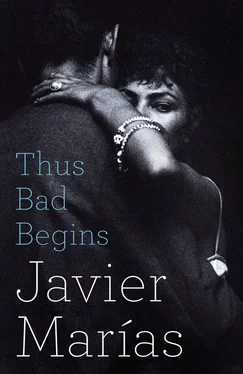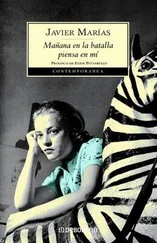I crossed Calle Príncipe de Vergara and waited outside a shop called La Continental, which sold all kinds of things for the home: furniture, crockery, artefacts, all in excellent taste. (At least I think that was the shop: I’m not sure now if it existed then, and it certainly doesn’t now; and yet that is the shop that has remained lodged in my memory, perhaps because, later on, I spent a lot of time there with my wife, choosing items for our apartment, with me occasionally glancing across at No. 2 and thinking back to that day.) I could go inside to pass the time, while keeping a close eye on the doorway for when Beatriz re-emerged, I wanted at least to know how long she would spend in there, not that any activity requires a great deal of time, how long a meeting lasts doesn’t really tell you anything. I couldn’t help but speculate while I waited: I didn’t think she would have gone to see the lawyer or the doctor, although that couldn’t be discounted. The name ‘221B BS’ made me suspect that it was a detective agency; I couldn’t help associating that strange name with 221B Baker Street, where Sherlock Holmes and Dr Watson lived and received their various intriguing commissions. It seemed more likely to me that Beatriz would be visiting them: unhappy people often insist on trying to uncover the full magnitude of their unhappiness, or choose to investigate other people’s lives as a distraction from their own. She could have been visiting Gekoski or Meridianos, whatever they were, or Marius K and his journeys to the Middle East, or someone else, who had no plaque. However, I inclined towards Deverne Films, after all, they were in the same line of work as her husband and she would probably know them. I hadn’t paid much attention to that conversation in the café, but I did notice the founder’s handsome son, Miguel Deverne, a young man not much older than me, but who was dressed with surprising aplomb in suit and tie and even wearing cufflinks, which I thought very old-fashioned. He was a friendly man, with a warm, ready laugh, any woman would have found him attractive, even a woman in her forties, especially if she had spent painful, frustrating years being rejected by her husband.
The sight of Beatriz and Van Vechten a few days before had revealed a new active aspect of her personality, or had perhaps shrouded or contaminated my view of her, if I can put it like that (the truth is that I had seen nothing, only her face and her closed eyes), and now I imagined her in that same pose all the time, which was both inappropriate and unfair, since at home she always behaved discreetly and even timidly sometimes — especially in Muriel’s presence, as if she were apologizing for her very existence — he had managed to cow her, to diminish her, despite her robust build and stature, to make her feel she was in the way, as if she were something imposed by custom or by a commitment made long ago, which, precisely because it was now old, could no longer be questioned; she even seemed somewhat apologetic with me too, and for months hardly dared to speak to me because I so clearly belonged to her husband’s world, and he was someone she dreaded, possibly even feared. And so it seemed to me that regardless of who she was seeing in Plaza del Marqués de Salamanca, the meeting was sure to be of a sexual nature, however much I kept telling myself that this wasn’t necessarily the case, that she might well have an appointment with the lawyer, Mollá, to discuss a possible divorce when divorce eventually became legal; or with Dr Arranz about some problem or symptom or out of pure hypochondria, and that the doctor could well be a psychiatrist or psychologist — the plaque didn’t specify what field he was in — and it would have come as no surprise to discover that Beatriz was going to a therapist to unburden herself or to learn to cope better with her sorrow; she could be hiring a private investigator to look into some incident or individual from the past or present (she might want to probe into the origin of her misfortune), or be planning a trip to Egypt or Syria; she could be interceding on Muriel’s behalf, trying to get the distributors to take on a project of his that was otherwise hanging by a thread; she could be doing business with Gekoski, which sounded to me like the name of a dodgy auctioneer or an upmarket pawnbroker, if such things still exist. And yet despite all this hypothesizing, I still kept imagining a repetition of the scene with Van Vechten. It even occurred to me, in my meanderings, that she might be prostituting herself to help her husband — unconditional love does not exclude paradox and, as the word ‘unconditional’ indicates, such love is capable of anything — and she had gone there to offer her body to the founder of the company, Deverne, who would be in his sixties or older and would be unlikely to turn his nose up at the chance.
‘Hers is such a woeful bed,’ I thought, ‘that she has to visit other beds, or dispense with beds altogether, so that she doesn’t risk feeling the contrast with her own cold, solitary bed, to which she returns each night. She can’t bear to be still and simply accept her fate, so she seeks out these forays, these adventures. She would far rather be with Muriel, but since he won’t have her, she refuses simply to languish or waste away at home, and in her more animated moments, she looks for substitutes, as almost everyone does, very few of us ever find what we yearn for, or if we do, we don’t hang on to it for very long, and who knows how long she managed to hang on to her happiness.’ We strive to conquer things, never thinking, in our eagerness, that they will never definitely be ours, that they rarely last and are always susceptible to loss, nothing is ever for ever, we often fight battles or hatch plots or tell lies, commit vile deeds or acts of treachery or foment crimes always forgetting that the thing we obtain might not last (it’s a very ancient fault in all of us, to see the present as final and forget that it’s inevitably and infuriatingly transitory), and that once their effect fades or expires, all the battles and plots, the lies and vile deeds, the betrayals and crimes will seem utterly futile to us, or worse, superfluous: such a waste of verve, such a squandering of energy, we might as well have saved ourselves the bother, since nothing much has changed. We are led on by wicked haste and easily surrender ourselves to poisonous impatience, as I once heard Muriel describe it, although whether he was quoting someone else I have no idea. We see no further than tomorrow and see it as the end of time, just as if we were little children believing that our mother’s momentary absence will be definitive and irreversible, that she has abandoned us completely; that if our hunger or thirst is not immediately satisfied, we will remain hungry and thirsty for ever; that if we suffer even the tiniest of scratches, the pain will never end, we don’t even foresee the scab forming; that if we feel safe and protected now, we will feel so for the rest of our life, which we can only conceive of from day to day or hour to hour or five minutes to five minutes. In that respect, we don’t change very much when we’re adults, not even when we’re old and what remains to us of life is so much shorter. The past doesn’t count, it’s time expired and negated, a time of error or ingenuousness and ignorance, which we end up perceiving as merely pathetic, and what ultimately invalidates and overwhelms it is this idea: ‘How little we knew, how stupid we were, how innocent, we had no idea what awaited us and now we do.’ And in that state of present knowledge, we are incapable of bearing in mind that tomorrow we will know something else and today will seem as stupid to us as yesterday or the day before or the day on which we were first thrust into the world, or perhaps this happened in the middle of the night beneath the bored and scornful moon. We go from deceit to deceit and know that, in that respect, we are not deceived, and yet we always take the latest deceit for the truth.
Читать дальше












